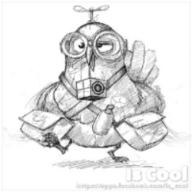she speaks very good French, but then she did live in Paris for 3 years
she speaks very good French--but then she did live in Paris for 3 years
actually, i don't know i should use "," or "--"
which sentence is better?
2008-08-04 12:35 pm
回答 (4)
2008-08-08 11:01 pm
✔ 最佳答案
第一句的用法 (用comma), 一般係前後句的意思相反, 而作對比。例:
I thought the questions were very easy, but then again I'm a genius.
雖然問題好易, 不過o禁, 我都好聰明!!
I found their conversation very dull, but then I have different tastes.
我發覺佢地的對話好悶, 不過o禁, 我都覺得有另一番味道o既!!
but then = but on the other hand 但雖然係o禁 (在另一方面), ...
但係, 第一句的用法 (用comma), 前後句並無相反的意思 (在巴黎住了3年, 法文講得好係好正常), 所以應該係第二句的用法較好。因為, 當你要在句子中忽然加插另一個想法時, 就可以用dash。
例:
I think you would look fine wearing either the silk blouse -- the one with the blue pattern -- or the angora sweater. (Abrupt interruption)
We pored over exotic, mouth-watering menus from Nemo Catering, Menu du Jour, Taste Temptations, and three other reputable caterers -- and rejected them all. (Dashes also mark sharp turns in thought).
圖片參考:http://tw.yimg.com/i/tw/ugc/rte/smiley_1.gif
2008-08-08 15:16:46 補充:
我意思係話
因為後句 "but then she did live in Paris for 3 years" 係說話者忽然醒起要加插o既補充資料 (補充佢前句: 點解她的法文講得這麼好), 所以用dash 會較適合。
2008-08-13 2:50 pm
thanks for jeanniehy, 克成, wonghangtat2002, and erictang007
you did give me some very good improved sentences
however, the main question is ---> actually, i don't know i should use "," or "--"
you did give me some very good improved sentences
however, the main question is ---> actually, i don't know i should use "," or "--"
2008-08-12 11:27 pm
Both don't make sense,
She speaks good French BECAUSE she had lived in Paris for three( when you write, you should use words, not numbers) years.
She speaks good French BECAUSE she had lived in Paris for three( when you write, you should use words, not numbers) years.
2008-08-04 5:46 pm
two is wrong~
she speaks very good French, but then she did live in Paris for 3 years
you should add could before speaks
change but then to because or as
she could speak French well because she have lived in Paris for 3 years.
she speaks very good French, but then she did live in Paris for 3 years
you should add could before speaks
change but then to because or as
she could speak French well because she have lived in Paris for 3 years.
收錄日期: 2021-04-28 16:33:52
原文連結 [永久失效]:
https://hk.answers.yahoo.com/question/index?qid=20080804000051KK00351


